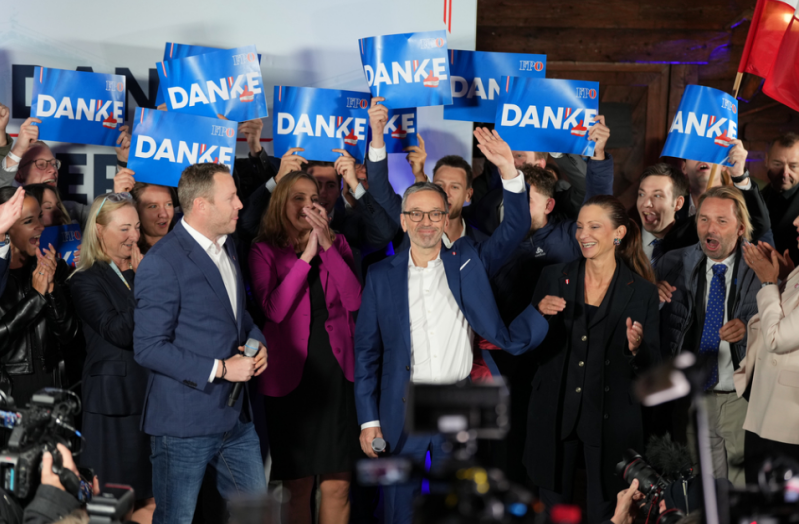
Austria has seen a far right political party winning the largest vote share in a general election held on Sept. 29, marking a significant change in the political landscape. A leading evangelical body has called for prayer as negotiations continue to form a new government.
Die Freiheitliche Partei Österreichs (The Freedom Party of Austria, FPÖ) is the first far right political party since the Second World War to mark such an achievement, gaining 29 percent of votes for the 183-member National Council.
Nine parties fielded candidates in all of the constituencies with a turnout of 77 percent of eligible voters. The FPÖ was just ahead of the liberal conservative Austria People’s Party (ӦVP) on 26 percent, and Social Democrats on 21 percent. The lack of a clear overall winner means negotiations are needed to form a coalition government.
FPÖ, led by Herbert Kickl, campaigned with the slogan “Fortress Austria – closing borders, guaranteeing security” and plugged for policies about living costs, stopping immigration and appeasing Russia after its invasion of Ukraine. Kickl reportedly said the election result opened the door to a new era.
"We've made Austrian history because it's the first time the Freedom Party is number one in a parliamentary election, and you have to think how far we've come," Klick said, according to Reuters.
Founded in 1956, the earliest iteration of the FPÖ had former Nazi officers as leaders. However, a research briefing by the British House of Commons Library said the party was seen as centrist liberal until a change of leadership under Jörg Haider in the 1980s when it became populist and radical right-wing.
The party was briefly included in a government deal in 2000, causing the European Union to impose sanctions, and then became a junior partner in a coalition government with the ÖVP from 2017 to 2019. It collapsed, according to the research briefing, after Heinz-Christian Strache, then-leader of the FPÖ, “was recorded offering state secrets to a woman posing as a Russian oligarch.” The party is opposed to sanctions against Russia and is neutral on the issue of the Ukraine war.
Meanwhile, in exclusive comments sent to Christian Daily International, Oliver Stozek, general secretary of the Österreichische Evangelische Allianz (Austria Evangelical Alliance) was pleased by the very high voter turnout for the election. Stozek also praised the election campaign itself for being fair overall and “without any major mud-slinging” or personal attacks by the leading candidates against each other. He saw both these facets as answers to prayer.
He also acknowledged that many voters would be thrilled that Gudrun Kugler is still a member of parliament for the ӦVP. She is a pro-life Catholic theologian and founder of advocacy group Europe for Christ! – with firm beliefs opposing human trafficking and advicating for rights for people with disabilities, freedom of religious belief, as well as biblical heterosexual marriage.
Stozek was also pleased that the International Parliamentary Prayer Breakfast in Austria will continue.
Commenting directly on the election result however, Stozek highlighted two issues: false portrayals of evangelicals on the campaign trail, and the need to pray for negotiations needed to form a coalition government, following the FPÖ’s success.
On the first point, Stozek outlined freedom of religious belief concerns about reactions to Austrian Christians taking a biblical stand on social issues during the election campaign, such as pro-life believers campaigning near abortion clinics.
“During the election campaign there were false accusations that portrayed evangelicals as radical pro-lifers, accusing them of harassing women outside abortion facilities and threatening doctors who perform abortions,” Stozek said.
“The goal of these accusations was to establish laws and ban miles [sic] around such facilities. It must be said that these acts would already be punishable by law and not a single complaint (whether justified or not) has been made in this context.”
“This shows that these accusations were made up out of thin air,” he added, “and were only aimed at legalizing abortion and achieving a legal entitlement to nationwide care and cost coverage by the state.”
On the second point, Stozek opined two aspects after such a high number of voters seemingly changed allegiance from other main parties such as the center right ÖVP, which had formed the previous coalition government with the Greens in 2020.
“Firstly, the Greens have lost around a third of their voters and secondly, many ÖVP voters have switched to the FPÖ,” he said. “This indicates that Austrians want to see a change in a conservative and business-friendly direction – as can also be seen from the strong gains made by the Neos party [9 percent of votes].”
Stozek added that “even if there are extreme right-wing nationalists in the FPÖ, not all voters are right-wing extremists.”
He pointed to apparent evidence in polls showing that most voters wanted a coalition formed between the FPÖ and the ÖVP.
A statement about the election on the FPÖ website seems to concur with this view.
“In purely mathematical terms, an ÖVP-SPÖ coalition (92 seats in total) would only just manage to get a majority (183 MPs in total in parliament),” the FPÖ statement read. “An anti-FPÖ coalition… would therefore require one of the two small parties, which in turn makes homogeneous politics… hardly possible and does not really reflect the will of the voters.
“As surveys clearly show, the majority of Austrians want a blue-black coalition government to get the country back on track. The FPÖ could form a solid majority with either of the two former major parties.”
However, Stozek predicted that such a political agreement would not come without its challenges.
“Even if these two parties are closer to each other thematically, it currently looks as if this will not come about due to the respective leading candidates. This would result in a coalition between the ÖVP and the SPÖ, possibly with the Neos or the Greens as a third partner.”
Stozek made it clear that the Österreichische Evangelische Allianz was apolitical and did not take a stance on individual parties or politicians – opting instead to maintain cordial relations and contact with all of them.
Even so, the EA general secretary foresaw a challenging political time for Austria as the coalition discussions continued.
“What is clear, however, is that the coalition negotiations will not be easy,” added Stozek, “and we must pray for the politicians in particular during this phase.
“Let us also pray that we get a government that contributes to the good of the country.”






